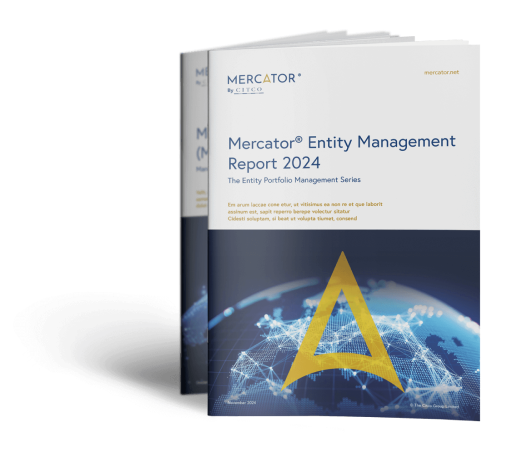The information contained in this document is marketing material and for informational purposes only. The information contained in this document is presented without any warranty or representation as to its accuracy or completeness and all implied representations or warranties of any kind are hereby disclaimed. Recipients of this document, whether clients or otherwise, should not act or refrain from acting on the basis of any information included in this document without seeking appropriate professional advice. The provision of the information contained in this document does not establish any express or implied duty or obligation between Citco and any recipient and neither Citco nor any of its shareholders, members, directors, principals or personnel shall be responsible or liable for results arising from the use or reliance of the information contained in this document including, without limitation, any loss (whether direct, indirect, in contract, tort or otherwise) arising from any decision made or action taken by any party in reliance upon the information contained in this document. © The Citco Group Limited, December 2024.
5 Entity Management KPIs for In-House Legal Teams
Entity Management Key Performance Indicators (KPIs) are becoming increasingly crucial for maintaining and managing the health and compliance of a multinational corporation’s entity portfolio.
Entity Management KPIs provide essential visibility to boards and help to demonstrate how effective compliance drives growth. Regular updates on these standardized metrics are increasingly expected, ensuring proper management and compliance across all entities.
Moreover, high performance in these KPIs can offer competitive advantages, facilitating smoother mergers and acquisitions, supporting market expansion, and enhancing the company’s ability to secure financing or enter strategic partnerships.
Here we explore five Entity Management KPIs and the risks of not measuring and managing effectively.
1. Ultimate Beneficial Ownership (UBO) Compliance
KPI Example: 100% of entities have up-to-date UBO information filed with relevant authorities within required deadlines.
UBO compliance is crucial for transparency and combating financial crimes such as money laundering and tax evasion. Many countries now require companies to disclose their ultimate beneficial owners to regulatory authorities.
Risks of non-compliance:
- Exclusion from public tenders or contracts
- Significant financial penalties
- Reputational damage
- Potential criminal prosecution
- Difficulty in opening bank accounts or accessing financial services
2. Timely Statutory Compliance
KPI Example: 95% of all statutory filings (annual returns, financial statements, tax declarations) submitted on time across all jurisdictions.
Timely statutory compliance is fundamental to maintaining good standing in each jurisdiction where a company operates, ensuring that the entity remains legally operational and compliant with local laws.
Risks of non-compliance:
- Late filing penalties and fines
- Loss of good standing status
- Potential deregistration of the entity
- Personal liability for directors
- Inability to obtain certificates of good standing, hindering business operations
3. Data Protection Compliance
KPI Example: Zero reportable data breaches and 100% compliance with data protection regulations (e.g., GDPR, CCPA) across all entities.
With the increasing focus on data privacy globally, compliance with data protection regulations is critical for maintaining customer trust and avoiding severe penalties.
Risks of non-compliance:
- Substantial fines (up to 4% of global annual turnover under GDPR)
- Reputational damage and loss of customer trust
- Potential class-action lawsuits
- Operational disruptions due to regulatory interventions
4. Board Composition Compliance
KPI Example: All entities maintain board composition in line with local legal requirements and internal governance policies.
Proper board composition ensures compliance with local regulations, supports effective corporate governance, and can be crucial for maintaining tax residency status in certain jurisdictions.
Risks of non-compliance:
- Invalidation of board decisions
- Loss of tax residency status or beneficial tax treatments
- Regulatory penalties
- Challenges in obtaining necessary business licenses or permits
- Potential personal liability for directors
5. Know Your Customer (KYC) Compliance
KPI Example: 95% of entities maintain up-to-date KYC documentation for all relevant stakeholders (e.g., directors, shareholders, bank accounts).
KYC compliance is crucial for preventing financial crimes and maintaining relationships with financial institutions and business partners. Effective KYC strategies also contribute to business continuity, ensuring operations can continue uninterrupted.
Risks of non-compliance:
- Account freezes or closure by financial institutions
- Disruption of financial transactions
- Difficulty in opening new accounts or accessing financial services
- Increased scrutiny from regulators
- Potential fines and penalties
- Suspended services from strategic partners and vendors (legal, financial advisors, auditors etc.)
How to track KPIs
Implementing robust systems and processes to track these KPIs is essential. Many companies are turning to advanced entity management software solutions to help automate compliance tracking and reporting. These tools can provide real-time visibility into the compliance status of each entity, helping in-house teams to proactively manage risks and ensure adherence to global regulatory requirements.
Conclusion
These five KPIs represent critical areas of focus for in-house legal teams managing global entity portfolios. By consistently monitoring and striving to meet these KPIs, multinational businesses can:
- Minimize legal and financial risks associated with non-compliance
- Maintain good standing and operational continuity across all jurisdictions
- Protect the company’s reputation and stakeholder trust
- Avoid operational disruptions due to compliance issues
- Demonstrate a commitment to good corporate governance and transparency
Daiva Dudenaite
Senior Vice President, Client Services, Mercator by Citco, Citco Mercator UAB
Bianca Erb
Business Development Manager, Mercator by Citco, Citco Fund Services (USA) Inc.
How Mercator can help:
Mercator supports in-house teams by providing comprehensive entity management solutions, including our proprietary technology – Entica® – for real-time compliance tracking, expert guidance on regulatory requirements in over 180 jurisdictions, and tailored services for UBO reporting, statutory filings, and KYC processes.
Our global expertise and proactive approach help companies efficiently manage, measure, and meet critical entity management KPIs across multiple jurisdictions.
Contact us to find out more.

